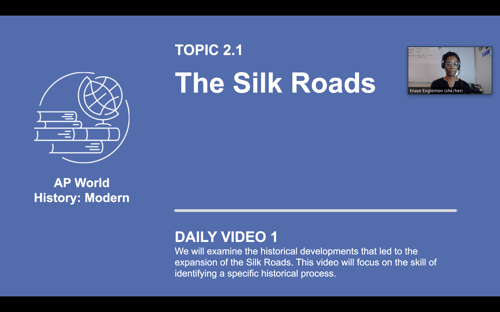Spring 2020 was a challenging time for the College Board, which not only manages the SAT but also Advanced Placement (AP) exams. As the end of the school year neared, when most students and teachers would be amping up their AP coursework in anticipation of exams in May, many students--and their studies--came to a screeching halt thanks to COVID-19 quarantines.
In response to what, for some, resulted in a shortened school year, the College Board scrambled to put together educational course videos on YouTube to help students fill in the gaps. Unfortunately, the videos were quite long and students struggled to engage with them. The response was less than ideal.
The College Board learned from the challenges of last spring and, in response, is creating AP Dailys, a new video resource, which is their way of making sure there’s as much accessibility and equity as possible in a time of hybrid and remote learning. Tampa Prep AP World History teacher Enaye Englenton, a long time AP Reader and current AP Exam Leader in the subject, has been tapped by the College Board to be one of the content creators for some of the AP World History Daily units.
“What I appreciate about the College Board is that they really are responsive. They had to create a whole new system. You know there’s gonna be bumps and flaws, but they’re quick to make sure they’re doing everything they need to for next year,” Englenton says. “They realize that students across the country are in all different situations so they've added these AP Dailys for every topic in their course curriculum guide.”
The lessons are made up of no more than three videos each, and each video is no more than 10 minutes long. The goal is to provide students with a resource for overview, review, and skill practice.
A team of teachers were hired to create a set of videos for each AP subject matter. Englenton was charged with shooting videos for AP World History Units 2 and 3 so far. Though she does not love being in front of the camera, she admits that it’s an interesting process. “The College Board has invested a lot into training and providing production materials for this. They sent us a video camera, headsets, and a ring light so that we can set up production spaces. Each team has a producer. It’s a whole production.” she says.

Englenton says she agreed to participate because, “I have a deep belief in equity when it comes to education,” she says. “I saw firsthand when scoring [AP exams] this year that when physical buildings were shut down, so many schools shut down completely. Education stopped. We [at Tampa Prep] were lucky to keep teaching and engaging our classes, but for so many students, the 2020 exam was a nightmare because they never got a full year of lessons. So I wanted to be a part of creating something that hopefully makes it a little better this year.”
Since the 2021 AP exams will be given as the full exam again this year, the College Board hopes to provide as many resources as possible to help students and teachers in terms of clarity and support. The AP Dailys will be one such resource. Englenton says, “As a teacher you can assign a video and see which and how many students have watched it and how much time they spent on it. It can be something you use in the classroom, remotely, or something students can use independently for review.”
One of the videos Englenton created walks students through how to write a thesis statement. “So if teaching thesis statements isn’t a teacher’s strong suit, or a student needs to hear it a different way, which is often the case, they can easily reference that video,” she says. Every video is specifically attached to a skill so teachers and students can search that skill to find videos that relate to it.
A veteran teacher, Englenton acknowledges that COVID-19 has been an unexpected catalyst for change in the educational community. “Forced remote learning really provided an opportunity to make some real fundamental changes--good changes--that hopefully will be supported moving forward.”
The first unit for every AP subject is now live and available to any student with a College Board account or access to YouTube.